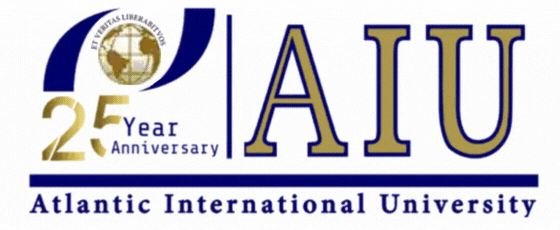- RESEARCHDistance Learning at AIU is enhanced by vast academic resources and innovative technologies build into the Virtual Campus: Hundreds of self-paced courses with video lectures and step by step lessons, thousands of optional assignments, 140,000 e-books, the Social Media & Networking platform allowing collaboration/chat/communications between students, and MYAIU develop students holistically in 11 areas beyond just academics.
- PROGRAMS OFFERED
- Areas of Study
- Courses and Curriculum
- Open Courses
- Register for a Program
- Associate Program
- Associate in Addiction Counseling
- Associate in Agriculture Food And Resources
- Associate in Anti Terrorism Security
- Associate in Behavior Analysis In Special Education
- Associate in Bioethics
- Associate in Climatology
- Associate in Cultural Theological Communication
- Associate in Culinary Arts
- Associate in Ecotechnology
- View all Associates Programs
- Bachelor Program
- Bachelors in Community Development
- Bachelors in Environmental Science
- Bachelor in Education (B.Ed, BS)
- Bachelors in Economics
- Bachelors in Entrepreneurship
- Bachelors in Financial Administration
- Bachelors in Human Resource Management
- Bachelors in Linguistics
- Bachelors in Nutritional Science
- Bachelors in Occupational Health and Safety
- Bachelors in Psychology
- View all Bachelor Programs
- Doctorate Program
- Doctor | of Biology (PhD)
- Doctorate in Business Administration (DBA, PhD)
- Doctor of Economics (PhD)
- Doctor of Electrical Engineering (D.Sc, PhD)
- Doctor of Finance (PhD)
- Doctorate in International Relations
- Doctorate in Information Technology (D.Sc)
- Doctor of Legal Studies (PhD)
- Doctor of Project Management (PhD)
- Doctor of Sociology (PhD, D.Sc)
- Doctorate in Sustainable Natural Resources Management
- View all Doctorate Programs
- Master Program
- Postdoctoral Program
- Postdoctoral in Animal Science
- Postdoctoral in Anti Terrorism Security
- Postdoctoral in Behavior Analysis In Special Education
- Postdoctoral in Bioethics
- Postdoctoral in Blockchain Technology and Digital Currency
- Postdoctoral in Business Management
- Postdoctoral in Cloud Computing
- Postdoctoral in Computer Engineering
- View all Postdoctoral Programs
AIU offers a wide range of majors in areas including the Arts, Business, Science, Technology, Social, and Human studies. More than 120 degrees and programs are available for adult learners at the associate’s, bachelor’s, master’s, doctoral and postdoctoral level. - VIRTUAL CAMPUS
Distance Learning at AIU is enhanced by vast academic resources and innovative technologies build into the Virtual Campus: Hundreds of self-paced courses with video lectures and step by step lessons, thousands of optional assignments, 140,000 e-books, the Social Media & Networking platform allowing collaboration/chat/communications between students, and MYAIU develop students holistically in 11 areas beyond just academics.
- ALUMNI
The world is YOUR campus!”, that is the message of AIU’s month magazine Campus Mundi. Hear the voices and see the faces that make up AIU. Campus Mundi brings the world of AIU to you every months with inspirational stories, news and achievements by AIU members from around the world (students and staff are located in over 200 countries).
Personal, Gender, Social and Moral Development
Exploring Personal, Gender, Social, and Moral Development in Education
The document examines personal, gender, social, and moral development, emphasizing their interconnectedness in shaping individual behavior and identity. It discusses the importance of self-awareness, societal influences, and ethical principles, particularly in educational settings, to foster growth, empathy, and responsibility among students from elementary to middle school stages.

The document provides an in-depth exploration of personal, gender, social, and moral development, highlighting their significance in shaping individual behavior and identity. It begins by discussing personal development, which encompasses self-awareness, self-esteem, and self-concept. These aspects influence how individuals perceive themselves and their abilities, with high self-esteem often leading to confident behavior, while low self-esteem may result in hesitance and uncertainty.
The text emphasizes the role of gender development in shaping behavior and identity, noting that societal expectations and stereotypes can significantly impact how individuals express themselves. It points out that societal norms dictate appropriate behaviors for different genders, influencing personal choices and actions.
Social development is also addressed, focusing on the importance of interactions with family, peers, and the community. These interactions teach social norms, communication skills, and values, fostering empathy, cooperation, and strong social bonds, which contribute to a sense of identity and belonging.
Moral development is discussed in terms of forming ethical principles, values, and beliefs that guide individuals in distinguishing right from wrong. This aspect of development shapes identity by defining one’s sense of integrity, justice, and responsibility towards others.
The document outlines the stages of development in an educational context, particularly in elementary and middle school settings. It highlights the need for educators to recognize and nurture these developmental aspects to help students cope with challenges and achieve their goals. For instance, in elementary school, children begin comparing themselves to peers, which can lead to feelings of accomplishment or inadequacy. Educators are encouraged to promote a growth mindset, allowing students to take risks and set personal goals.
The text also discusses the importance of role models in education, emphasizing that teachers should embody values such as kindness, respect, and responsibility. By modeling these behaviors, educators can positively influence students and help them internalize important principles.
Additionally, the document addresses non-stereotypical gender roles, suggesting literature that presents diverse and empowering narratives. Books like “Grace for President” and “Red: A Crayon’s Story” are recommended for their ability to challenge traditional gender roles and encourage discussions about identity and self-discovery.
Finally, the document concludes by reiterating the interconnectedness of personal, gender, social, and moral development, asserting that understanding these processes is crucial for fostering self-awareness, empathy, and ethical responsibility in students, ultimately contributing to their personal growth and well-being in society.
Atlantic International University
Get to know the AIU experience
Contact Us Today!
We understand how busy adults do not have time to go back to school. Now, it’s possible to earn your degree in the comfort of your own home and still have time for yourself and your family. The Admissions office is here to help you, for additional information or to see if you qualify for admissions please contact us. If you are ready to apply please submit your Online Application and paste your resume and any additional comments/questions in the area provided.
Pioneer Plaza
900 Fort Street Mall 905
Honolulu, HI 96813
800-993-0066 (Toll Free in US)
808-924-9567 (Internationally)
808-947-2488 (Fax)
AIU Success Stories







Contact Us Today!
Begin Your Journey!
AIU’s Summer of Innovation and Growth gives you the ability to earn up to $5000 in tuition credit by completing free lessons and courses.
Whether you’re looking to acquire new skills, advance your career, or simply explore new interests, AIU is your gateway to a world of opportunities. With free access to 3400 lessons and hundreds of courses the ability to earn credits and earn certificates there’s no better time to start learning.
Join us today as a Guest Student and take the first step towards a brighter, more empowered future.
Explore. Learn. Achieve.
Degrees

Contact Us
Atlantic International University
900 Fort Street Mall 905 Honolulu, HI 96813 [email protected]
Quick Links
Home | Online Courses | Available Courses | Virtual Campus | Career Center | Available Positions | Ask Career Coach | The Job Interview | Resume Writing | Accreditation | Areas of Study | Bachelor Degree Programs | Masters Degree Programs | Doctoral Degree Programs | Course & Curriculum | Human Rights | Online Library | Representations | Student Publication | Sponsors | General Information | Mission & Vision | School of Business and Economics | School of Science and Engineering | School of Social and Human Studies | Media Center | Admission Requirements | Apply Online | Tuition | Faculty & Staff | Distance Learning Overview | Student Testimonials | AIU Blogs | Register for Program | Privacy Policy | FAQ



















